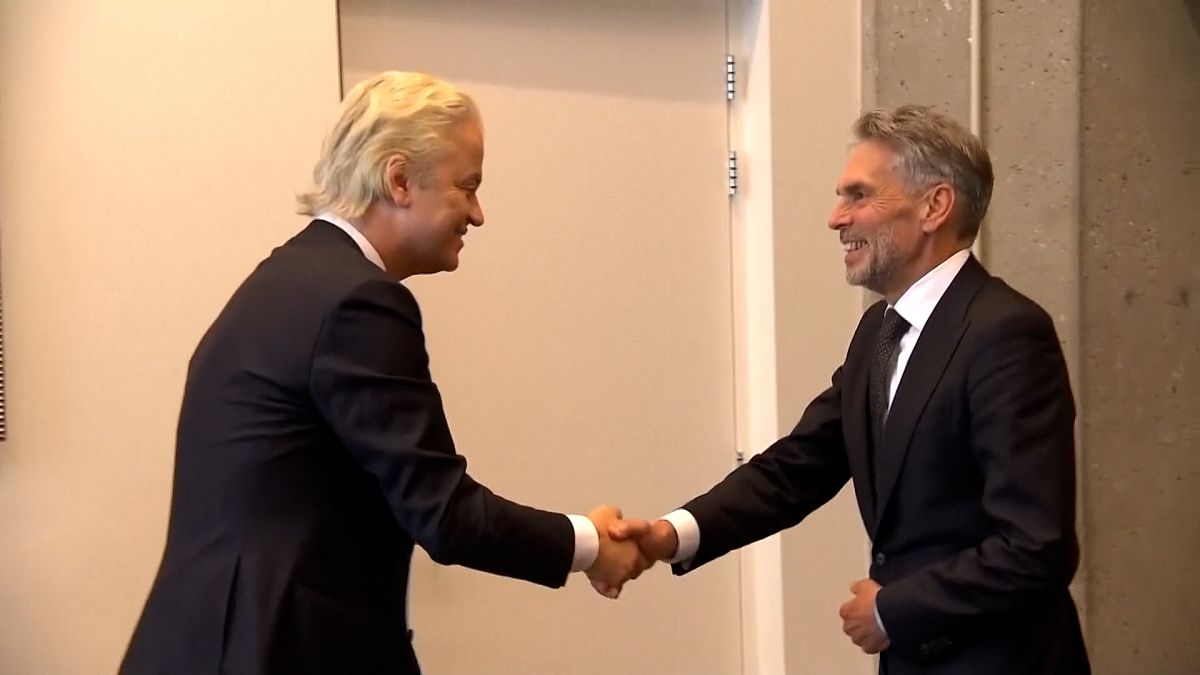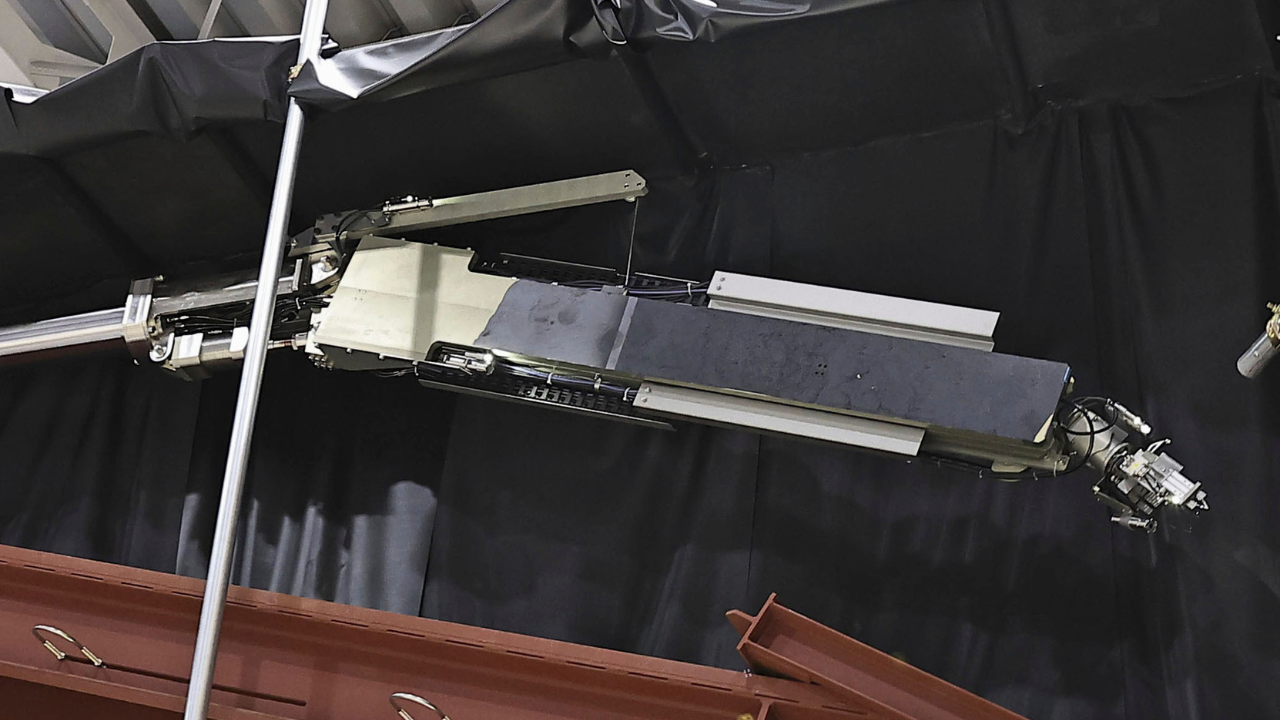World
How serious is the threat to democracy from the far-right?

According to Euronews’s latest Superpoll in April, Germany’s far-right party AfD are polling in second place for the European elections next month. Is the current government doing enough to counteract the threat from the far-right?
Political violence is on the rise in Germany, and news that politicians from the Green party and Social Democrats (SPD) were attacked whilst putting up voting posters on Friday in Dresden has shocked the nation.
Many, including the leaders of the SPD in Saxony, Kathrin Michel and Henning Homann, blamed the far-right Alternative for Germany (AfD) party. AfD denied strongly that it was behind these attacks and said election campaigns should be without violence.
Earlier this year, hundreds of thousands gathered across major cities in Germany to protests against the far-right. Many experts fear that AfD would change the constitution, school curriculum and introduce new laws, at the very minimum.
Those who say they’ll vote for AfD often want a change in politics and complain that all the other established parties including the Christian Democratic Union (CDU) and SPD are the same.
Social democrats from Germany and Europe held a democracy congress in Berlin on Saturday, where they promised not to cooperate with far-right parties, in the likely event that coalitions may need to be formed.
But is the current government doing enough to counteract the threat from the far-right?
Independent non-government organisation Amadeu Antonio Foundation spokesperson Lorenz Blumenthal told Euronews that the government is trying.
“At least they are now acknowledging what threat the far-right poses to democracy and the people living in Germany. But of course, a lot of mistakes were made in the past by not fully acting up on right wing extremism especially concerning the juridical branch. A lot of crimes remained unpunished. And that, of course, leads to a new self-consciousness of the far right, because if people are not punished for their crimes, they can repeat them and they feel in a way empowered.”
Blumenthal also suggests there is problem with image and recommends that politicians take more active steps to be more honest with voters, and admit that mistakes may have been made, “for instance, the corona pandemic, which might have seen a little too much of political restrictions.”
He also says that it would help politicians be taken more seriously by voters if they acknowledge that times are hard in global crises but also celebrate national victories. Many mainstream parties are afraid of being labelled as nationalist, so stray from being proud of achievements.
“But especially for Germany, we haven’t been doing all too bad. Germany even came out of the pandemic surprisingly well. We achieved so much as a country in terms of doing a very credible transformation towards more green energy, towards jobs,” Blumenthal acknowledges, highlighting that the recession didn’t hit Germany as hard as the AfD is portraying: The shift that really needs to happen is also to be proud of these things.”
“If we break it down,” Blumenthal adds, “the AfD is fear mongering in the best sense. They portray this apocalyptic scenario that migration will ruin Germany, that the support for Ukraine and for Israel will ruin Germany. It’s always just basically picking up votes by fearmongering.”
This tactic can be seen across populist parties in Europe: “If we go back to point X, Y, Z in time, which, for the AfD, is like the 50s, then everything will be fine. And it’s just this very nostalgic backward vision for, for Germany that I, at least, don’t want to live in,” Blumenthal says.

World
Former spy chief expected to be new prime minister of the Netherlands

It has taken months of post-election negotiations to form a right-wing government.
A former spy chief was tipped as the new Prime Minister of the Netherlands.
Former head of the Dutch spy agency and counter-terrorism office Dick Schoof was tipped on Tuesday to become the nation’s new Prime Minister.
The 67-year-old will lead a coalition dominated by Geert Wilders’ radical right-wing Freedom Party.
The coalition is also made up of the centre-right People’s Party for Freedom and Democracy, centrist New Social Contract and the Farmer-Citizen Movement.
Schoof is currently the top civil servant at the Ministry of Security and Justice.
Wilders congratulated him in a post on X, saying he “has a great track record, is non-partisan and therefore above the parites, has integrity and is also very likeable.”
Anti-Islam firebrand Wilders, who topped the polls in last year’s elections, struck a deal with the other party leaders earlier this month – capping months of negotiations that left it unclear who would become the new Dutch prime minister.
The new agreement, framed with the slogan “Hope, courage and pride”, includes plans to impose strict measures on asylum seekers, scrap family reunification for refugees and reduce the number of international students studying in the country.
At one point, the 26-page document says the government will seek to “deport people without a valid residence permit as much as possible, even forcibly”.
Wilders’s preferred candidate for prime minister withdrew last week following allegations he had been involved in medical patent fraud.
World
South Africa's ANC support around 42% days before election, poll finds

World
Operating company of Fukushima to use robot to remove melted nuclear fuel from destroyed reactor

- A company demonstrated a remote-controlled robot for retrieving melted fuel debris at Japan’s destroyed Fukushima Daiichi nuclear power plant.
- The plan involves deploying an extendable pipe robot into the reactor to begin debris removal by October.
- Approximately 880 tons of highly radioactive melted nuclear fuel remain in the three damaged reactors.
The operator of Japan’s destroyed Fukushima Daiichi nuclear power plant demonstrated Tuesday how a remote-controlled robot would retrieve tiny bits of melted fuel debris from one of three damaged reactors later this year for the first time since the 2011 meltdown.
Tokyo Electric Power Company Holdings plans to deploy a “telesco-style” extendable pipe robot into Fukushima Daiichi No. 2 reactor to test the removal of debris from its primary containment vessel by October.
That work is more than two years behind schedule. The removal of melted fuel was supposed to begin in late 2021 but has been plagued with delays, underscoring the difficulty of recovering from the magnitude 9.0 quake and tsunami in 2011.
DRONE AIMS TO EXAMINE JAPAN’S DAMAGED FUKUSHIMA NUCLEAR REACTOR FOR THE FIRST TIME
During the demonstration at the Mitsubishi Heavy Industries’ shipyard in Kobe, western Japan, where the robot has been developed, a device equipped with tongs slowly descended from the telescopic pipe to a heap of gravel and picked up a granule.
Tokyo Electric Power Company Holdings, also known as TEPCO, the operator of Japan’s wrecked Fukushima Daiichi nuclear power plant, reveals a robot to be used to retrieve debris at the power plant in Kobe, western Japan, on May 28, 2024. (Kyodo News via AP)
TEPCO plans to remove less than 1 ounce of debris in the test at the Fukushima plant.
“We believe the upcoming test removal of fuel debris from Unit 2 is an extremely important step to steadily carry out future decommissioning work,” said Yusuke Nakagawa, a TEPCO group manager for the fuel debris retrieval program. “It is important to proceed with the test removal safely and steadily.”
About 880 tons of highly radioactive melted nuclear fuel remain inside the three damaged reactors. Critics say the 30- to 40-year cleanup target set by the government and TEPCO for Fukushima Daiichi is overly optimistic. The damage in each reactor is different, and plans must accommodate their conditions.
Better understanding the melted fuel debris from inside the reactors is key to their decommissioning. TEPCO deployed four mini drones into the No. 1 reactor’s primary containment vessel earlier this year to capture images from the areas where robots had not reached.
-

 Movie Reviews1 week ago
Movie Reviews1 week ago‘The Substance’ Review: An Excellent Demi Moore Helps Sustain Coralie Fargeat’s Stylish but Redundant Body Horror
-

 Movie Reviews1 week ago
Movie Reviews1 week ago‘Rumours’ Review: Cate Blanchett and Alicia Vikander Play Clueless World Leaders in Guy Maddin’s Very Funny, Truly Silly Dark Comedy
-

 Culture1 week ago
Culture1 week agoFrom Dairy Daddies to Trash Pandas: How branding creates fans for lower-league baseball teams
-

 News1 week ago
News1 week agoVideo: A Student Protester Facing Disciplinary Action Has ‘No Regrets’
-

 Movie Reviews1 week ago
Movie Reviews1 week ago‘Blue Sun Palace’ Review: An Intimate, Affecting and Dogma-Free Portrait of Chinese Immigrants in Working-Class New York
-

 World1 week ago
World1 week agoPanic in Bishkek: Why were Pakistani students attacked in Kyrgyzstan?
-

 Politics1 week ago
Politics1 week agoAnti-Israel agitators interrupt Blinken Senate testimony, hauled out by Capitol police
-

 Politics7 days ago
Politics7 days agoMichael Cohen swore he had nothing derogatory on Trump, his ex-lawyer says – another lie – as testimony ends

















